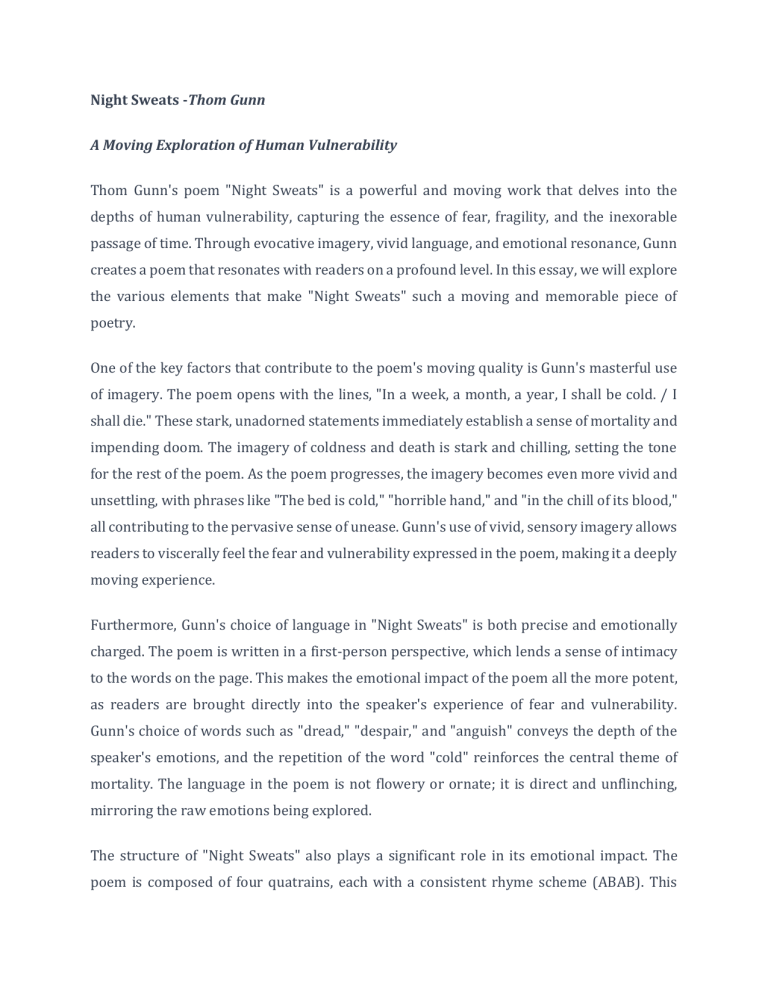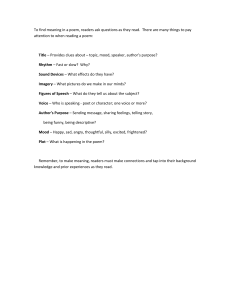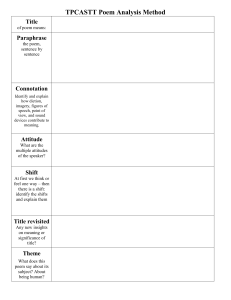
Night Sweats -Thom Gunn A Moving Exploration of Human Vulnerability Thom Gunn's poem "Night Sweats" is a powerful and moving work that delves into the depths of human vulnerability, capturing the essence of fear, fragility, and the inexorable passage of time. Through evocative imagery, vivid language, and emotional resonance, Gunn creates a poem that resonates with readers on a profound level. In this essay, we will explore the various elements that make "Night Sweats" such a moving and memorable piece of poetry. One of the key factors that contribute to the poem's moving quality is Gunn's masterful use of imagery. The poem opens with the lines, "In a week, a month, a year, I shall be cold. / I shall die." These stark, unadorned statements immediately establish a sense of mortality and impending doom. The imagery of coldness and death is stark and chilling, setting the tone for the rest of the poem. As the poem progresses, the imagery becomes even more vivid and unsettling, with phrases like "The bed is cold," "horrible hand," and "in the chill of its blood," all contributing to the pervasive sense of unease. Gunn's use of vivid, sensory imagery allows readers to viscerally feel the fear and vulnerability expressed in the poem, making it a deeply moving experience. Furthermore, Gunn's choice of language in "Night Sweats" is both precise and emotionally charged. The poem is written in a first-person perspective, which lends a sense of intimacy to the words on the page. This makes the emotional impact of the poem all the more potent, as readers are brought directly into the speaker's experience of fear and vulnerability. Gunn's choice of words such as "dread," "despair," and "anguish" conveys the depth of the speaker's emotions, and the repetition of the word "cold" reinforces the central theme of mortality. The language in the poem is not flowery or ornate; it is direct and unflinching, mirroring the raw emotions being explored. The structure of "Night Sweats" also plays a significant role in its emotional impact. The poem is composed of four quatrains, each with a consistent rhyme scheme (ABAB). This structured form provides a sense of order and control amidst the chaos of the poem's subject matter. The regular rhythm of the poem mirrors the steady progression of time, which adds to the sense of inevitability and vulnerability. Gunn's use of enjambment and caesura in the poem creates a sense of breathlessness and urgency, as if the speaker is grappling with their fear and mortality in real-time. This structural choice allows readers to connect with the speaker's experience more deeply and feel the weight of their vulnerability. The central theme of "Night Sweats" is the human experience of fear and vulnerability in the face of mortality. Gunn's exploration of these universal themes resonates with readers on a deeply emotional level. The poem speaks to our shared human experience of confronting our mortality, a topic that is both unsettling and inevitable. Through his evocative imagery, precise language, and structured form, Gunn invites readers to confront their own vulnerabilities and fears, making "Night Sweats" a moving and thought-provoking work of poetry. In conclusion, Thom Gunn's "Night Sweats" is a deeply moving exploration of human vulnerability, fear, and mortality. Through the poem's vivid imagery, emotionally charged language, and structured form, Gunn creates a work that resonates with readers and encourages them to reflect on their own mortality and vulnerability. "Night Sweats" stands as a testament to the power of poetry to engage with profound human experiences, making it a poem that will continue to move and inspire readers for generations to come.




